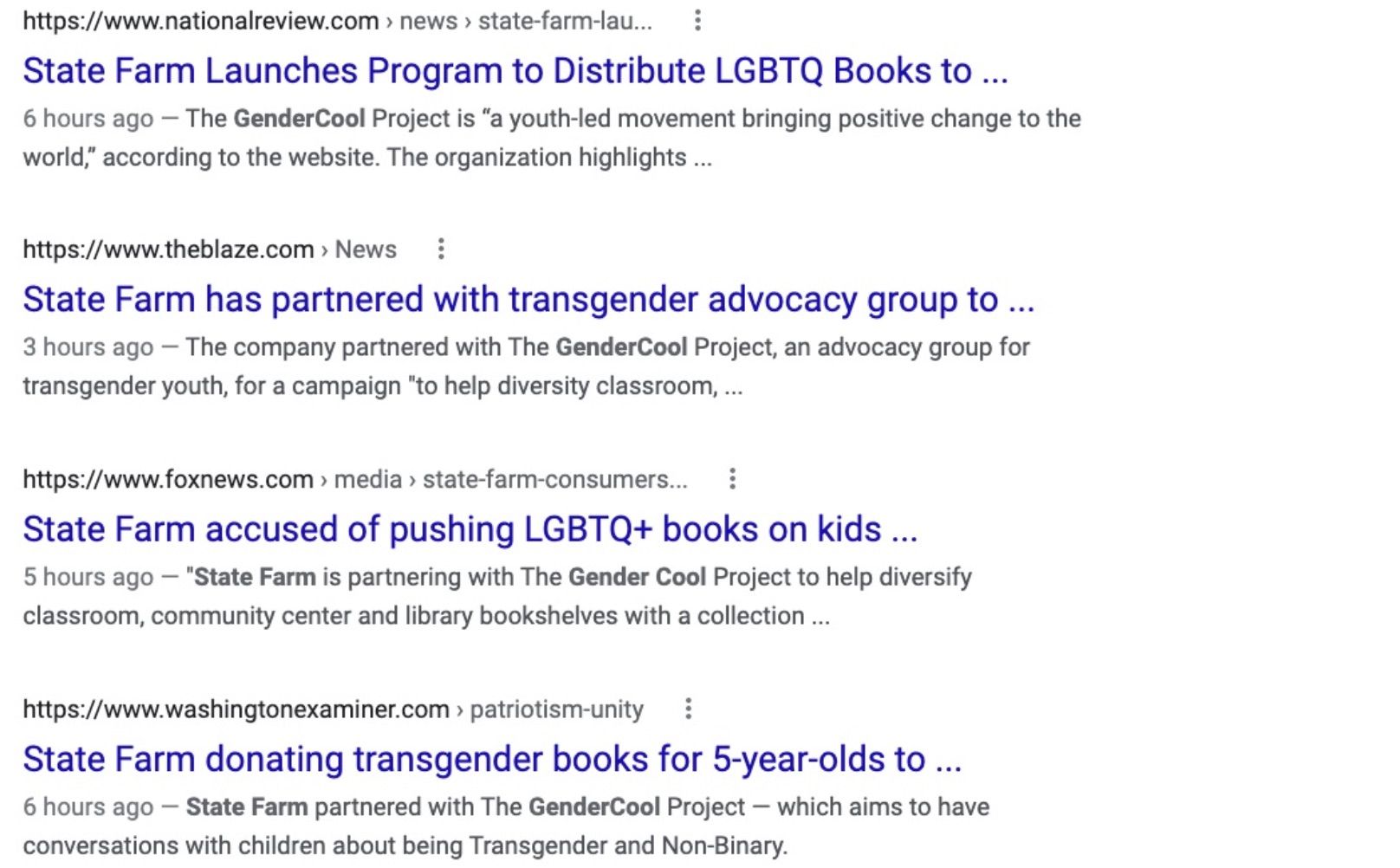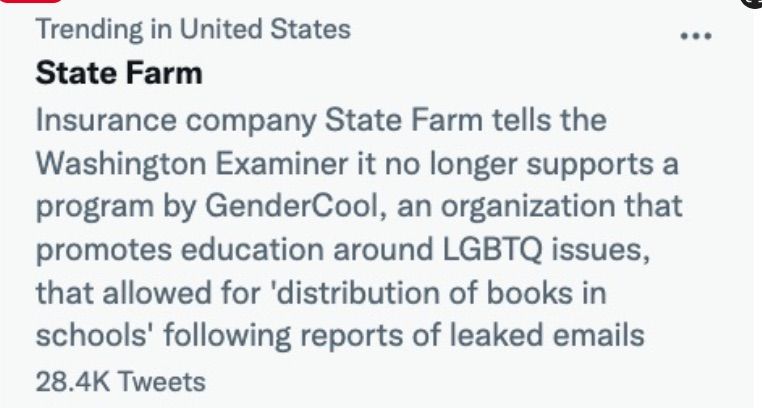If your memory about last week is hazy, no one can blame you. But it was less than two weeks ago since a massive misinformation-generation campaign caused people on both the left and the right to declare they were canceling their insurance through State Farm.
The story began on Monday via the National Review, a right-wing media machine. According to an email leaked to Consumers’ Research — a group that purposefully sounds like Consumer Reports but is instead a machine meant to generate outrage against “woke” companies — a leader in State Farm’s company reached out to Florida agents in January asking if they’d like to take part in a project to “help diversify classroom, community center and library bookshelves with a collection of books to help bring clarity and understanding to the national conversation about Being Transgender, Inclusive and Non-Binary.” Jose Soto, who wrote the email that was leaked, said that “The project’s goal is to increase representation of LGBTQ+ books and support out communities in having challenging, important and empowering conversations with children Age 5+.”
This story trickled down through the Moms For Liberty groups on Monday afternoon, generating the precise rage it was meant to elicit. Indeed, as of Monday afternoon, only the National Review and affiliates had begun to spread this news of the partnership; no reputable source – not State Farm, not GenderCool, not a single information outlet — had covered the story. The image below is of a Google search for “GenderCool” and “State Farm” on Monday, May 25, at 4:30 pm Eastern time. All of these sources are right-wing outlets.

Tuesday morning, State Farm trended on Twitter. The Washington Examiner — another right-wing outlet — shared the story that State Farm pulled out of the program because of backlash.

That morning, prior to the murder of 21 people in a Uvalde, Texas, classroom, the left began its outrage. They, too, would be canceling their insurance through State Farm.
The right-wing media owned the entire outrage cycle, on both sides of the aisle, as they leaked the story, passed it through right-wing social media, then updated the story through another outlet, and created outrage through the left.
But what’s the true story?
Consumers Research, who got the leaked email from Soto, has spent the last several months building a marketing campaign against State Farm. “Like a Creepy Neighbor” conveniently launched at the same time as the leaked email, though it had been in the works for months. The email, which they received in January and is legitimate, helped them ignite the campaign.
Also legitimate is the response from State Farm in the wake of the news last week, wherein they ended their partnership with GenderCool:
State Farm’s support of a philanthropic program, GenderCool, has been the subject of news and customer inquiries. This program that included books about gender identity was intended to promote inclusivity. We support organizations that provide resources for parents to have conversations about gender and identity with their children at home.
We do not support required curriculum in schools on this topic. As a result, we have made the decision we will no longer be affiliated with the organization. We will continue to explore how we can support our associates, as well as organizations that align with our commitment to diversity and inclusion, including the LGBTQ+ community. We recognize and value the diversity of all people and support a culture of respect and inclusion in the communities in which we live and work, as well as our workplace.
But here’s one missing piece of the story: GenderCool does not distribute books to schools.
Another missing piece of the story: State Farm bought the books from GenderCool as part of this partnership and all of the books were distributed in March by agents who volunteered to receive them. The dissolution of their partnership happened, but it occurred after the books had been given away.
State Farm has a history of supporting LGBTQ+ organizations, so their partnership with GenderCool was a natural fit. Both are based in Illinois and both have had the support of state legislation’s LGBTQ caucus and Equality Illinois.
GenderCool launched in 2018 as a group that helps share the stories of transgender and nonbinary young people through education on the things these individuals are doing, through a mentorship program that pairs trans/nonbinary young people with leaders in C-Suites to help adults learn about who they are and what they’re doing in the world, and through culture by amplifying these voices. It is powered by young people. Their goal is to end misinformation about who transgender and nonbinary youth are and showcase their stories in positive light.
In a partnership with A Kids Book About, four young trans and nonbinary teens were able to share their stories in three books: A Kids Book About Being Transgender, A Kids Book About Being Inclusive, and A Kids Book About Being Nonbinary. These books were written by young people, with an audience of young people and those who are eager to learn about these kids and others like them.
This story is a convoluted one, and that’s on purpose. There are other organizations who work with GenderCool, including another major insurance agency. But the email that began the story not only mistook the purpose of the partnership — it was not to get books into schools — but that misstep launched the larger campaign, as public schools continue to be battle grounds for “parents rights.” This, as those groups would say, is all part of the “grooming” principals of public education.
At the end of the day, State Farm bought the books and distributed them. The partnership ended, which means that these young people’s stories will no longer help State Farm in their quest to better educate and empower their company. But why now and not when the email leaked or prior to the books being distributed in March, when the ending is symbolic as opposed to actionable? Aside from the time to build Consumers’ Research’s “Like A Creepy Neighbor” campaign, the news releases coincide with several noteworthy dates: Pride month in June, the 100th anniversary of State Farm insurance, and the amplification of anti-queer legislation across the USA, including in Florida, where groups like Moms For Liberty have a chokehold on state legislation.
One positive to come out of this misinformation campaign is that it allowed GenderCool to reach even more radars. You can learn more about them and donate to help them continue their work. A group dedicated to ending misinformation being connected to a well-coordinated misinformation campaign feels a little too on the nose.
Call To Action
In last week’s censorship news roundup, I said Pride displays would be a major target this year. I’ve now heard of at least five or six instances of this happening.
This week, go to your library and see if they have a display — if you can’t go in person, poke around on their website or social media to see if they have highlighted LGBTQ+ books. If you are in person, check something out from it; if you’re online, request one. Then, write to your library board and your city council to let them know you appreciate this. Explain that you found a great new book to read thanks to the display or list and that that representation is vital for your whole community.
It’s easy, but it’s powerful.
This Week’s Censorship News: June 3, 2022
- Pride displays are off the table in Lafayette Parish public libraries (LA). So are displays on Black history and women’s history. Speaking of history, here’s a look at this library board’s long history of censorship.
- The Anchorage Public Library saga continues (see here). During an investigation of the library’s administrator, the mayor fired the investigator. Convenient way to continue covering up what is really going on.
- A must-read about Moms For Liberty.
- And another must-read about the definition of obscenity, specifically as it relates to a lawsuit around Gender Queer.
- Fantastic reporting on what Wisconsin’s GOP is doing right now in the books-in-schools debate. Spoiler: it’s ugly.
- Four books will stay on shelves as-is in St. Johns County (FL) schools, while 2 will have new restrictions placed on them and one will be moved from middle to high school shelves.
- Aside from the bizarre book restrictions/choices made here — there is a single Baby-Sitters Club book only available to 3rd-5th grade students — a home-grown system in this Missouri school district will alert parents about what their students are borrowing from the library. This sets a dangerous precedent; it should not be a thing at all, but it should absolutely not be a thing individual districts create for themselves. Expect a lot of books to simply disappear. . .
- Multiple people have to read a book now to include it in a library collection in Roanoke, Virginia, schools and parents get to weigh in, too. This is such a tremendous waste of time and taxpayer money when library workers have a million other things to do in the school day: “The proposed media policy has essentially been entirely rewritten. Some of the main changes specify selecting media for students which “provides differing viewpoints on controversial subjects.” Two librarians must read and review media before it is added to the catalog, and one librarian must do the same at the secondary level. If the books are approved by all librarians in the elementary and secondary schools, it will then be added to the library database for parents to review for two weeks before being officially added to the school catalog.”
- As of writing, there hasn’t been an update on the outcome for this review of The Color Purple and How To Be an Anti-Racist in Park County Schools (Wyoming).
- The Idaho Education Association isn’t happy about Nampa schools removing 22 books permanently. Chances are certain legislators in the state truly do not care.
- Oakley Public Library (KS) will keep Fred Gets Dressed on shelves after a challenge.
- Eight books challenged in Spotsylvania school libraries (VA) will be kept on shelves.
- In the Abilene Public Library (TX), adults are complaining about LGBTQ+ books in the children’s section. The library hasn’t taken any action.
- The book policy being explored in Central Bucks schools (PA) is even raising red flags from the state’s ACLU chapter.
- Ignore the sensational headline pulled from a parental quote. In St Tammany Parish (LA), a number of parents are upset about a book that explores the debate around free speech that is part of a summer reading program.
- The Thing About Jellyfish is being challenged in St Mary public schools (Maryland) because it apparently sexualizes children.
- Posters about gender drew a pretty unbelievable crowd to the Gorham school board meeting (ME). “Neile Nelson, a Gorham High School math teacher, said the best thing she’s done as a parent was to “step away” and trust teachers, administrators and those in charge of the school district.”
- “The petition says it is a “formal complaint and request” to remove four books from University high school and middle school libraries: “Lawn Boy,” “Gender Queer,” “All Boys Aren’t Blue” and “The Bluest Eyes” — an apparent misspelling of “The Bluest Eye” by Toni Morrison, which is not in the school libraries, according to Jennifer Weaver, director of University Schools.” — in Greeley, Colorado.
- The status of “Don’t Say Gay” bills and their impact on educational curriculum across the US as of Wednesday.
- I’m linking to a series of my own tweets from earlier this week, but the “BookLooks”/Moms For Liberty rating system is, according to its creator, being implemented in two districts for the fall. I’ve FOIA’d one of the districts.
- “Only parents, school employees and school board members have standing to initiate a formal challenge to sensitive material in school libraries – an element that was strongly opposed by a vocal contingent of community members and parents.” In St. George, Utah, schools, there’s a new challenge and review policy for books that sounds fairly solid…and community members are mad that only parents can file complaints, not just anyone who feels like it.
Also In This Story Stream
- Business As Usual: Book Censorship News, May 27, 2022
- You Need To Talk About The Sex Parts in Banned Books: Book Censorship News, May 20, 2022
- The School Board Project, Round One: Book Censorship News, May 13, 2022
- How to Update Your Book Challenge Forms (with Template): Book Censorship News, May 6, 2022
- How One District Is Pushing Back Against Book Banning: Book Censorship News, April 22, 2022
- What Do School Boards Do?: This Week’s Book Censorship News, April 15, 2022
- No Actions Offered to Librarians to Help With Book Bans From National Org: Book Censorship News, April 8, 2022
- Technology for Parent Monitoring of Student Library Use is Being Developed by Follett: This Week’s Book Censorship News, April 1, 2022
- The Censorship Story I Can’t Tell You: This Week’s Book Censorship News, March 25, 2022

